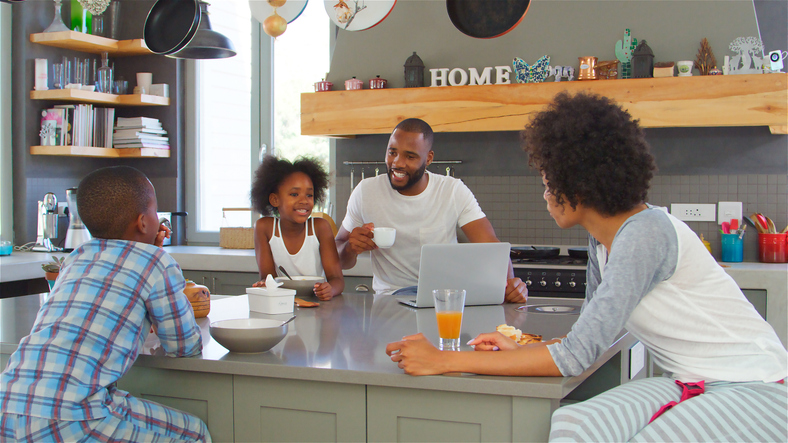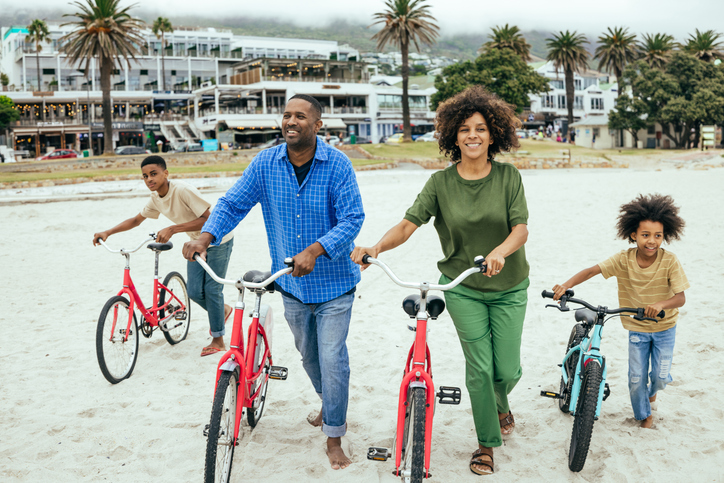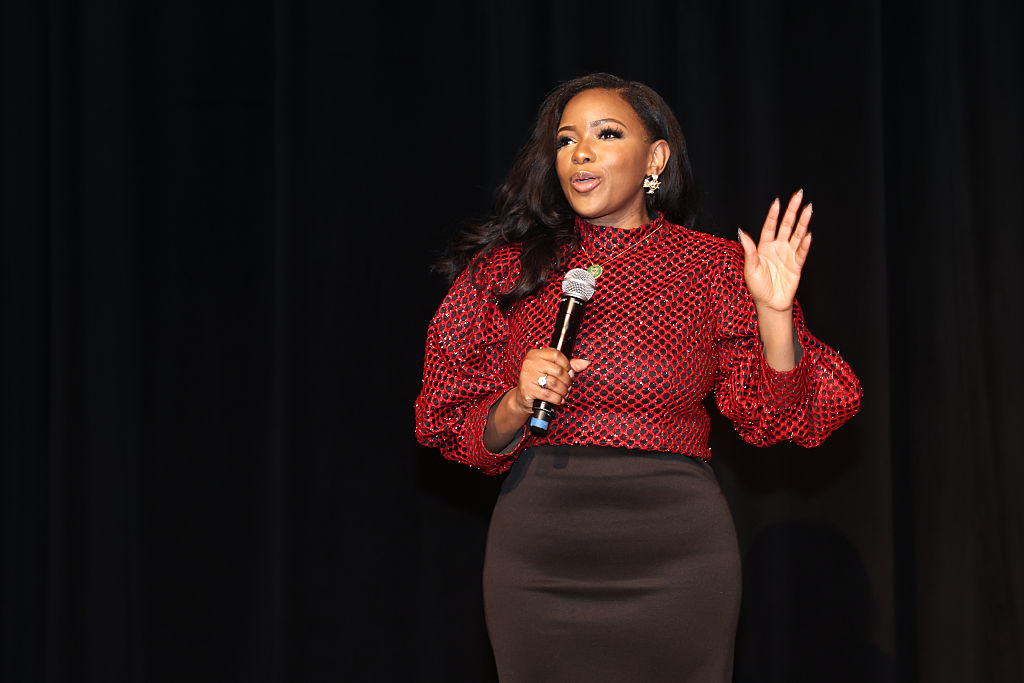Op-Ed: Black Fathers Vs. The Media And The Manosphere

It is a shame that Black dads remain haunted by the biased musings of a dead racist.
More than 50 years ago, Daniel Patrick Moynihan, a white sociologist who served as Assistant Secretary of Labor, published a report entitled The Negro Family: The Case for National Action, where he claimed that increasing amounts of “out-of-wedlock births” and single-parent homes would lead to the destruction of the Black family.
One of the 20th century’s most controversial documents, it is the basis of the longstanding falsehoods that depict Black fathers in America as “absent” and “uninvolved” in their children’s lives and single-mother-led homes as impediments to racial progress. It is designed to scapegoat the government’s failure to tackle poverty and instead flip it on Black folks as some kind of moral failing.
They are stereotypes that have been fueled by politicians in both parties over the years in addition to the likes of enforcement officials like New York City police commissioner Bill Bratton, who on August 31, 2015, in response to growing outrage against police violence and mass incarceration, cited Moynihan’s decades old government report to excuse the actions of the NYPD.
“Talk about being prescient about what was going to happen in Black society, in terms of he was right on the money, the disintegration of family, the disintegration of values,” Bratton explained.
A more recent example is a racist tome published by the New York Post shortly after the 2024 presidential election entitled “Trump won big with black men— now he must convince them to become better fathers.”
In it, David Christopher Kaufman argued: “Having scored historic levels of black support (and confidence), Trump is positioned to tackle the most serious and unspoken crisis among African Americans: the lack of black fathers in their children’s homes and lives.”
The only thing funnier than that suggestion is his follow-up: appointing Ben Carson to a Cabinet position because Carson “has spoken repeatedly about boosting black fatherhood as an ‘antidote’ to poverty and criminality.”
Ben Carson tried to destroy affordable housing, which one imagines would go a lot further in stability for Black families than a symbolic appointment of someone the community hasn’t rocked with collectively since the early 1990s.
What’s frustrating about stupid, racist musings like these is that, for all this talk about absentee fathers, in reality, studies have shown that this simply is not true about Black men.
In 2023, Florida Congresswoman Frederica Wilson, founder and chair of the Caucus on the Commission of the Social Status of Black Men and Boys, organized a congressional policy briefing at the U.S. Capitol Building to reshape the public perception of Black fathers.
There, she highlighted a 2013 Centers for Disease Control study that found Black fathers more involved in their children’s lives compared to other racial groups.

According to their National Health Statistics Report:
Black fathers (70%) who live with their children were most likely to have bathed, dressed, changed or helped their child with the toilet every day, compared with their white (60%) or Latino (45%) counterparts.
Moreover, Black fathers (78%) were also more likely to eat meals with their children every day compared with white (74%) and Latino fathers (64%). And, a higher percentage of Black fathers (27%) took their children to or from activities every day compared with white fathers (20%). Black fathers (41%) in the home were also more likely to help their children with homework every day compared with Latino (29%) or white (28%) fathers.
“Think about how this group was dogged by the school-to-prison pipeline, mass incarceration, health disparities and continuing to shoulder the gun violence epidemic, spends more time with their children than others,” Congresswoman Wilson said at the time.
“It is very disingenuous the way they are perceived and stereotyped across this nation,” Rep. Wilson continued. “It’s time to amplify the message.”
Indeed, the same study found that the majority of Black fathers live with their children, 2.5 million Black dads live with their kids, while about 1.7 million officially don’t, which by the way, still does not mean a child is “fatherless.”
We may have to yell it back at the mainstream media from now until the asteroid puts us down, but the data proves that Black dads are not the collective deadbeats many would argue them to be.
And as revealed in a study in 2018 led by researchers at Stanford, Harvard, and the Census Bureau, Black boys raised in America, even in the wealthiest families and living in some of the most well-to-do neighborhoods, still earn less in adulthood than white boys with similar backgrounds.
In fact, Black boys raised at the top, however, are more likely to become poor than to stay wealthy in their own adult households.
It’s always racism that’s plaguing us, rather than us ever being a plague to ourselves, and anyone genuinely concerned with Black families would start there.
Yet, in the days leading to Father’s Day, some of the same arguments have taken shape in national media, and subsequently, familiar arguments have returned on social media platforms.
There are, thankfully, reports of Black people doing their part in their communities to honor Black dads and combat negative stereotyping, but if there are two suggestions I can make, they are as follows.
First and foremost, though we should speak out against stereotyping, there’s something to be said for ignoring the source. If data does not convince them of the value of Black fatherhood, perhaps nothing will, and we should be better about tuning them out rather than fighting with the wind.
Fortunately, it appears many of us are already doing so, although I do worry about the role some of these alternative media entities are playing in how Black men are generally depicted.
I suppose we call it the “manosphere,” but ultimately, I mean any man on the internet with a microphone and/or some other kind of platform that spends all day arguing about masculinity and all perceived threats to it – which usually include women, trans people, queer folks, and straight men not as pressed with the preservation of the patriarchy as the average internet human woman hater.
Some of them do have a right-wing point of view and are presumably being bolstered by conservative figures, but in most cases, it’s just Black men willfully being roped into that incel life via shared misogyny and gullibility.
If you don’t know what I mean, it’s your friend who is on the internet arguing about baby mamas and random conspiracies to “feminize the Black man” that include Black queer and trans folks simply existing while defending Diddy, Tory Lanez, and DDG from apparent plots to be taken down.
I’d like to pretend it’s just people on the internet, but in 2025, most of us are on the internet and the same misogynistic drivel I scroll past online with greater frequency each month has long shown itself in any place I go where a lot of straight Black men are around.
That is not to generalize us, but years of lecturing from the likes of Kevin Samuels, DJ Akademiks, and many others I’d like to pretend don’t exist have done visible damage to some of us, and while we all have free will to consume what we please, these types are no less poisonous to the image of Black men than what’s found in the mainstream.
I’d love to see more Black men face this, but I won’t hold my breath.
I’ll simply just say Happy Father’s Day to all the good Black dads out there, and in the coming years, I hope we don’t become active participants in our negative portrayals.
Michael Arceneaux is a New York Times bestselling author whose most recent book, “I Finally Bought Some Jordans,” was published last March.
SEE ALSO:
Breaking Down Stereotypes: Why Are Black Fathers Absent?
The Ultimate Father’s Day Gift Guide For Every Father Figure In Your Life








